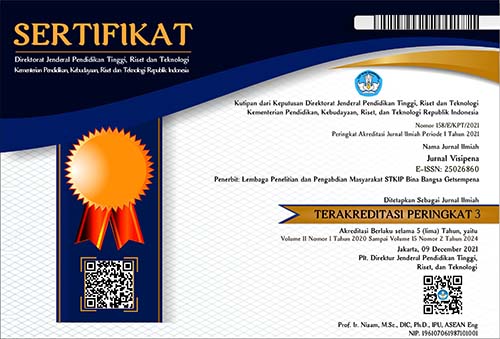ANALISIS KETERLAKSANAAN MODEL PEMBELAJARAN TEMATIK TERINTEGRASI HOTS DAN INKLUSI SOSIAL BERBASIS INTERNET OF THINGS
Abstract
Tujuan penelitian ini yaitu menciptakan pembelajaran beserta seluruh perangkatnya yang bisa digunakan dengan mudah dan praktis serta efisien bagi guru dan siswa untuk membentuk kemampuan berpikir tingkat tinggi (HOTS) dan inklusi sosial bagi siswa di Aceh yang umumnya heterogeny. Target khusus yang akan dicapai melalui penelitian ini yaitu dihasilkan: 1) model pembelajaran tematik terintegrasi HOTS dan inklusi sosial berbasis Internet of Things (IoT) yang valid, efektif dan praktis digunakan di Sekolah Dasar; 2) buku model pembelajaran yang memuat buku panduan guru, buku panduan siswa, Lembar Aktivitas Siswa (LAS), serta Rencana Pelaksanaan Pembelajaran (RPP) dari model pembelajaran tematik terintegrasi HOTS dan inklusi social berbasis IoT; dan 3) aplikasi moodle yang memuat substansi model pembelajaran yang dapat diaplikasikan oleh guru dan siswa sekolah dasar provinsi Aceh. Penelitian ini menggunakan beberapa tahapan, yaitu: pertama studi uji kelayakan dan kepraktisan produk menggunakan model pengembangan produk pembelajaran menurut Plomp, dengan tahapan: (1) pengkajian awal (define), (2) perancangan (design), (3) realisasi (konstruksi), (4) Pengujian, Evaluasi, dan Revisi (develop), dan (5) implementasi secara luas (eksperimen) dengan memperhatikan 3 kriteria kualitas produk yaitu: kevalidan, kepraktisan, dan keefektifan. Hasil yang diperoleh yaitu Sebanyak 97.5% siswa atau 38 siswa menyatakan minatnya mengikuti model MT Learning. Siswa tertarik karena memahami konsep dengan lebih baik dan tertarik untuk memecahkan masalah yang diangkat karena masalah tersebut disebabkan oleh fakta dan keadaan Lingkungan sehari-hari. Metode pengajaran guru sangat menarik, pembelajaran yang diajarkan dekat dengan keseharian siswa membuat mereka sangat senang untuk mengikuti pembelajaran.
Abstract
The purpose of this research is to create learning and all its tools that can be used easily and practically and efficiently for teachers and students to form higher order thinking skills (HOTS) and social inclusion for students in Aceh which are generally heterogeneous. Specific targets to be achieved through this research are produced: 1) HOTS integrated thematic learning model and Internet of Things (IoT)-based social inclusion that is valid, effective and practical to use in elementary schools; 2) a learning model book containing teacher manuals, student manuals, Student Activity Sheets (LAS), and Learning Implementation Plans (RPP) from the HOTS integrated thematic learning model and IoT-based social inclusion; and 3) the moodle application which contains the substance of the learning model that can be applied by teachers and elementary school students of Aceh province. This research uses several stages, namely: first a feasibility test study and product practicality using a learning product development model according to Plomp, with stages: (1) initial assessment (define), (2) design, (3) realization (construction), (4) Testing, Evaluation, and Revision (develop), and (5) broad implementation (experiment) by taking into account 3 product quality criteria, namely: validity, practicality, and effectiveness. At this stage, trial data on the implementation of the hots integrated thematic learning model and internet of things-based social inclusion were developed to get results with average scores getting valid, practical and effective criteria.
Downloads
References
Abdullah, A. H., Abidin, N. L. Z., & Ali, M. (2015). Analysis of students’ errors in solving Higher Order Thinking Skills (HOTS) problems for the topic of fraction. Asian Social Science, 11(21), 133–142. https://doi.org/10.5539/ass.v11n21p133
Ananda, R., Rafida, T., & Mardhatillah. (2023). The guidance website: Internet strategy implementation at the university in industrial 4.0 content. International Journal of Innovative Research and Scientific Studies, 6(2), 227–234. https://doi.org/10.53894/ijirss.v6i2.1242
Diputra, K. S. (2017). Pengembangan Multimedia Pembelajaran Tematik Integratif Untuk Siswa Kelas Iv Sekolah Dasar. JPI (Jurnal Pendidikan Indonesia), 5(2), 830. https://doi.org/10.23887/jpi-undiksha.v5i2.8475
Fahrurrozi, F., Sari, Y., & Rahmah, A. (2022). Pemanfaatan Model Project Based Learning sebagai Stimulus Kemampuan Berpikir Kreatif Siswa dalam Pembelajaran IPA Sekolah Dasar. Edukatif : Jurnal Ilmu Pendidikan, 4(3), 3887–3895. https://doi.org/10.31004/edukatif.v4i3.2794
Kasmini, L., & Mardhatillah. (2020). The influence of aceh culture-based learning model (MPB2A) integrated media information communication and technology on student learning outcomes in science learning. International Journal of Advanced Science and Technology, 29(5), 2051–2058.
Kasmini, L., Mardhatillah, M., & Prayudi, S. (2024). The impact of a gender mainstreaming-based blended learning flipped classroom model on the solidarity values and problem-solving abilities of students. 7(312), 226–239. https://doi.org/10.53894/ijirss.v7i1.2604
Khusnul Fajriyah, F. A. (2018). Analisis Keterampilan Berpikir Tingkat Tinggi Siswa Kelas V Sd Pilot Project Kurikulum 2013 Di Kota Semarang. Elementary School, 5(1), 1–6.
Li, J., Antonenko, P. D., & Wang, J. (2019). Trends and issues in multimedia learning research in 1996–2016: A bibliometric analysis. Educational Research Review, 28(November 2018), 100282. https://doi.org/10.1016/j.edurev.2019.100282
Mardhatillah, M. (2019). VALIDITY OF LESSON PLAN (RPP) THEMATIC LEARNING MODEL BASED ON GENDER AND DIVERSITY (KEBHINEKAAN). British Journal of Education Vol.7, 7(9), 29–34. https://doi.org/10.1017/CBO9781107415324.004
Mardhatillah, M., Sari, S. M., Surjono, H., & Muhtadi, A. (2019). Development of Teacher and Student Thematic Learning Books Based on Gender And Diversity for Elementary School Students In District of Aceh Barat. INTERNATIONAL JOURNAL OF SCIENTIFIC & TECHNOLOGY RESEARCH, 8(10), 10–12.
Mardhatillah, M., Verawati, verawati, Eviyanti, E., Pramuniati, I., & Ramadhani, F. (2019). Teaching Materials Based on Local Wisdom to Create Meaningful Learning in Aceh Province. 208(Icssis 2018), 101–105. https://doi.org/10.2991/icssis-18.2019.20
Nikiforos, S., Tzanavaris, S., & Kermanidis, K. L. (2020). Virtual learning communities (VLCs) rethinking: Collaboration between learning communities. Education and Information Technologies. https://doi.org/10.1007/s10639-020-10132-4
Sekeris, E., Verschaffel, L., & Luwel, K. (2019). Measurement, development, and stimulation of computational estimation abilities in kindergarten and primary education: A systematic literature review. Educational Research Review, 27, 1–14. https://doi.org/10.1016/j.edurev.2019.01.002
Simarmata, S. M., Sinaga, B., & Syahputra, H. (2022). Analisis Kemampuan Pemahaman Konsep Matematika Siswa Dalam Penerapan Model Discovery Learning Berbantuan Matlab. Jurnal Cendekia : Jurnal Pendidikan Matematika, 6(1), 692–701. https://doi.org/10.31004/cendekia.v6i1.1227
Subakti, D. P., Marzal, J., & Hsb, M. H. E. (2021). Pengembangan E-LKPD Berkarakteristik Budaya Jambi Menggunakan Model Discovery Learning Berbasis STEM Untuk Meningkatkan Kemampuan Berpikir Kreatif Matematis. Jurnal Cendekia: Jurnal Pendidikan Matematika, 05(02), 1249–1264. https://www.j-cup.org/index.php/cendekia/article/view/629/339
van Alten, D. C. D., Phielix, C., Janssen, J., & Kester, L. (2019). Effects of flipping the classroom on learning outcomes and satisfaction: A meta-analysis. Educational Research Review, 28(November 2018), 1–18. https://doi.org/10.1016/j.edurev.2019.05.003




















